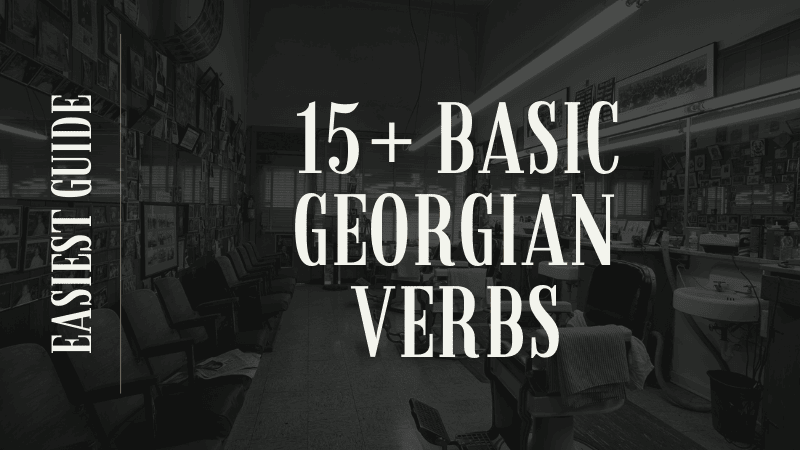Want to learn the basics of the Georgian language? There’s no denying that mastering some of the common words and phrases can do you good, but it is not enough for you to connect with the locals in a much meaningful way. If you genuinely want to be understood by the people, then learning the intricacies of the grammatical features can help you out. To start, let’s learn about the Georgian verbs in today’s post!
Most language learners want to become fluent or sound like native speakers of their target language. Some may spend their time using books, listening to native speakers to train their ears, or even go out there and join language exchange programs. Given the developments today, there are also several language learning resources available, and it is up to you to choose which one best fits your needs and level. There are also free downloadable apps like the Ling App, which can help you gain a deep understanding of over 60+ languages.
By using the Ling App, you can learn more about the grammatical aspects in as fast as 10 minutes per day! Today, we will give you an overview of the Georgian verbs, and if you want to dive much deeper into it, we highly recommend downloading the Ling App. If you are interested in that, let’s get it on!
Georgian Verbs: Overview
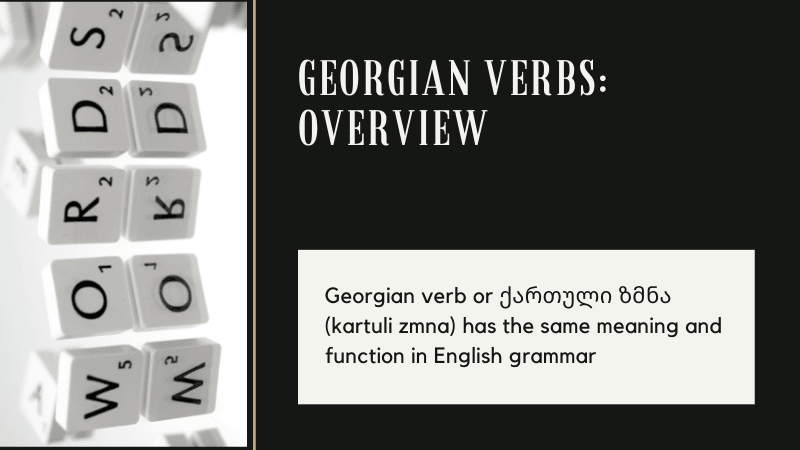
Unlike the English and European verbs, learning the Georgian verb is one of Georgian grammar’s most challenging and complex parts. You better understand the functions and structures of Georgian verbs first because it is harder to recognize and use the Georgian language without learning the basics.
Georgian verb or ქართული ზმნა (kartuli zmna) has the same meaning and function in English grammar. When we say the word, ‘verb’ describes an action (or an action word). But in the Georgian language, ten tenses are used. There is also an infinitive form of verbs (basic structure of a verb), which means they need to conjugate the word first to form a Georgian verb.
For instance, you may need to have these details such as the subject (person or number), direct or indirect object (person or number), tense, aspect, voice, mood, direction and orientation, causative, the version to form a single Georgian verb. The term’ verb screeve’ is used instead of ‘tense, ‘aspect,’ ‘mood,’ and others to identify the structures’ different time frames or moods in Georgian verbs. When we say ‘verb screeve,’ it is verb forms inflected word of a person or number, a set of six verb forms.
Furthermore, verbs in Georgian are divided into four classes: medial verb, intransitive verb, transitive verb, and indirect verb. Georgian verbs have no infinitive form, and there are several irregular verbs in Georgian verb forms.
Verb Conjugation
There are four types of verb conjugation in Georgian verbs. It would help to memorize the conjugation series and pattern type because it has its group. Below are the sample patterns and structures of Georgian verbs:
Note: Verbs in Georgian must include various particles such as suffixes (suffixal nominal marker obligatory, suffixal passive marker, and thematic suffix), prefixes, causative marker, imperfective marker, passive marker, nominal markers, auxiliary verb, and other types of affixes. These affixes express the meaning of the verb form and a particular tense in the Georgian language.
For example:
გააკეთებს (he/she will do)
Below is the breakdown of the sentence:
გა– is a preverb, it defines the verb’s main meaning.
ა – is a pre radical vowel (the vowel that is found between the subject prefix and verbal stem), the use of which is complicated
-კეთ– is the root of the verb
-ებ – is the present/future stem formant
-ს –is the person marker, here -ს denotes the third person singular
If you change the preverb in the given sentence above from გა– to შე– the meaning would change to he/she will repair (შეაკეთებს).
The Georgian verb form also differs in other Indo-European languages in terms of tenses. Below are the example of Georgian verbs (Romanized version) in the present tense, future tense, and past tense:
- Present Tense – the Georgian verb in the present tense used only the suffix –s in the singular for the third person. In plural form, the suffix – T is used in first and second persons, and the suffix – en for the third person.
For example:
Singular Form
Me visveneb – I rest
Sen isveneb – You rest
Is isveneb-s – He/she rests
Plural Form
Cven visvenebT – We rest
Tqven isvenebT -You rest
isini isveneb-en -They rest
Note: The first person also uses the prefix v- as the locution in the singular as well as in plural forms. The prefix v- shows the action direction.
- Past Tense – it uses the suffix –di both in singular and plural form
For example:
Visveneb-di – I rested
Sromob-di – You worked
- Future Tense – unlike in Indo-European languages, Georgian verbs in future tense insert the prefix -da,-ga, -i, and -a syllables inside the Georgian verb.
For example:
Da-visveneb – I will rest
Ga-vakeTeb– I will do
V-i-Sromeb – I will work (the verb stem has changed the inside syllable in this verb –o for -e).
In addition, Georgian verbs have ten tenses, but today, I will discuss the five main tenses: the present tense, imperfect tense, future tense, aorist tense, and optative tense. Below is the example with Georgian word and Romanized version:
1. Present tense – an action that is happening now (verb-ing or verb s/es)
For example:
ხათო წერილს წერს (tsers)
Khato writes a letter, or Khato is writing a letter
2. Imperfect tense – habitual action in the past or an action that is not yet finished
For example:
ხათო წერილს წერდა (tserda)
Khato wrote a letter (often), or Khato was writing a letter (in the morning)
3. Future tense – an action that will happen in the future
For example:
ხათო წერილს დაწერს (datsers)
Khato will write a letter.
4. Aorist tense – an action that is completed in the past.
For example:
ხათომ წერილს დაწერა (datsera)
Khato wrote a letter (the letter is finished)
5. Optative tense is a flexible tense that can be used for various reasons. It may express intention, desires, mode of action, and others.
For example:
ხათომ წერილს დაწეროს (datseros)
Let Khato write a letter (she should do it).
Note: The Optative verb form is usually followed by auxiliary verbs preceded by other verbs or auxiliary words.
15+ Basic Georgian Verbs
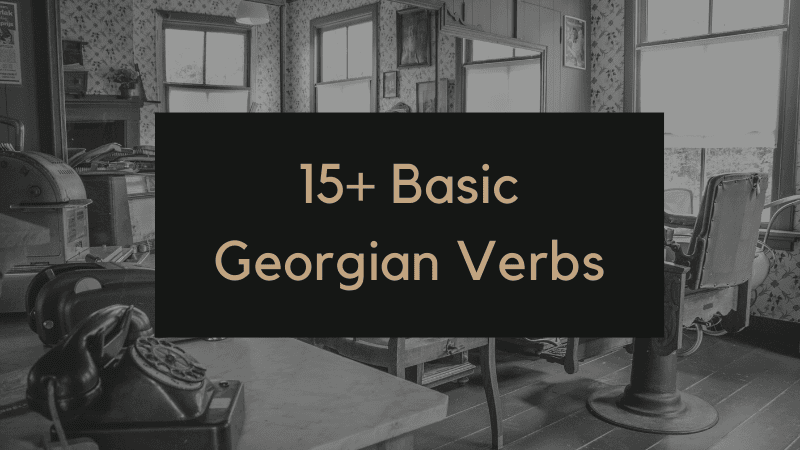
| Georgian Verbs | Pronunciation | English Translation |
| მე ამას ვერ მივიღებ | me amas ver mivigheb | I can accept that |
| ვაღიარებთ | vaghiarebt | we admit it |
| ბოდიშს გიხდით | bodishs gikhdit | I can apologize for |
| მათ მოაწყვეს ეს | mat moats’qves es | they arranged that |
| მე შემიძლია ხვალ ჩამოვიდე | me shemidzlia khval chamovide | I can arrive tomorrow |
| მას შეუძლია სთხოვოს | mas sheudzlia stkhovos | she can ask him |
| მათ მას თავი აარიდეს | mat mas tavi aarides | they avoid her |
| მათ გვითხრეს, | mat gvitkhres | they told us |
| მან მადლობა გადაუხადა | man madloba gadaukhada | she thanked him |
| მე ვფიქრობ ამაზე | me vpikrob amaze | I can think about it |
| ჩვენ გვესმის | chven gvesmis | we understand that |
| მათ სურთ, რომ | mat surt, rom | they want that |
| იგი წერს, რომ | igi ts’ers, rom | she writes that |
| ჩვენ ამაზე ვსაუბრობთ | chven amaze vsaubrobt | we talk about it |
| მე ამას ვუყურე | amas vuqure | I watched it |
| მე ამაზე ვისაუბრებ | me amaze visaubreb | I will talk about it |
| -ჩვენ ეს დავასრულეთ, დავამთავრეთ | chven es davasrulet, davamtavret | we finished it |
Other Basic Verbs In Georgian
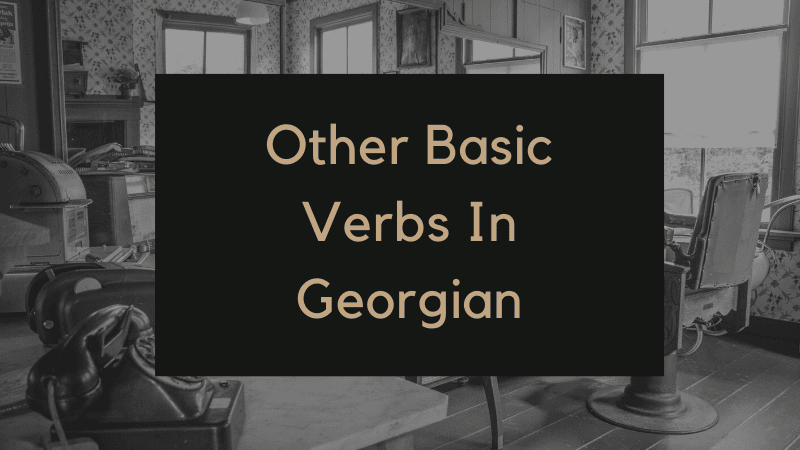
| Georgian Verb | Pronunciation | English Translation |
| თამაშობა | thamashoba | (to) play |
| მოცემა | motsema | (to) give |
| სიყვარული | siq’varuli | (to) love |
| სწონა | sts’ona | (to) like |
| სჭირდება | sch’irdeba | (to) need |
| მოგუნება | moguneba | (to) want |
| ცხობრობა | tskhovroba | (to) live |
| გონია | gonia | (to) feel |
| ხედვა | khedva | (to) see |
| სმენა | smena | (to) listen to |
| ლაპარაკი | laparaki | (to) speak / (to) talk |
| გაგება | gageba | (to) understand |
| ცნობა | tsnoba | (to) know / (to) be acquainted with |
| ცოდნა | tsodna | can / (to) know how to |
| იცინება | itsineba | (to) laugh |
| მოსვლა | mosvla (mosula) | (to) come |
| წასვლა | ts’asvla (ts’asula) | (to) go |
| მისვლა მიმართ | misvla mimarth | (to) go by […] (e.g. by vehicle) |
| წერა | ts’era | (to) write |
| კიტყვა | kitq’va | (to) read |
| დაანგარიშობა | daangarishoba | (to) count |
| სხოვნა | skhovna | (to) remember |
| გადავიწყება | gadavitsq’eba | (to) forget |
| ჩამა | chama | (to) eat |
| წთილობა | ts’thiloba | (to) try |
| მომსარება | momsareba | (to) use |
| გახსხნა | gakhskhna | (to) open |
| დახურა, დაკეტა | dakhura, daketa | (to) close |
| მისალმება | misalmeba | (to) greet / (to) welcome |
| დამთავება დასრულება | damthaveba dasruleba | (to) end |
Learning Georgian Verbs
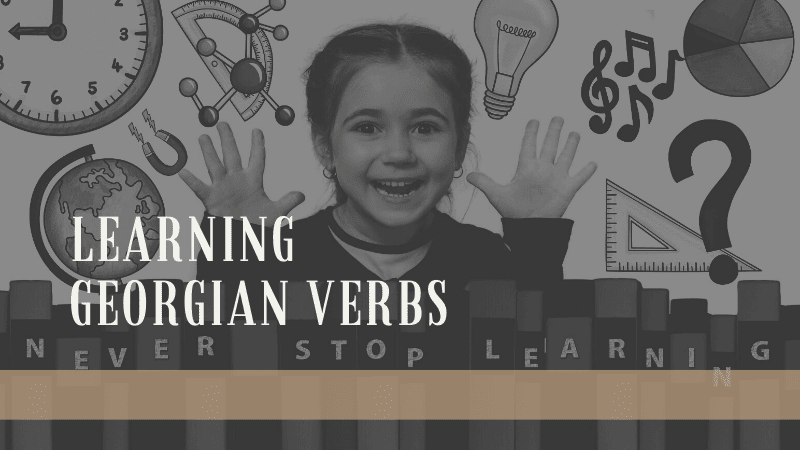
Now that you know that the Georgian verb form occurs by conjugation pattern and adding suffixes, you should memorize its patterns because it is usually learned by series. Another thing is, you should need to understand the Georgian verb template for a better understanding of the pattern. I know at first, it isn’t easy, but if you are motivated and eager to learn, there is a better way to learn the Georgian language. Ling app is here to guide and help in achieving your goal.
Learn More About The Georgian Language With Ling App

Are you interested in mastering this language? You can study and learn other lessons related to the Georgian language like the Georgian Alphabet and Funny Georgian Phrases here at the Ling App by Simya Solutions now!
Ling App is an easy-to-use language learning application that offers 60+ different languages like Georgian, Thai, Tagalog, Malay, Japanese, Korean, Khmer, Russian, and other minority languages. You can learn these 60+ languages by playing interactive games or reading fresh blog posts every day that provides information about your target language.
Want to learn in a new and more engaging way? Download and start learning with the Ling app now!
